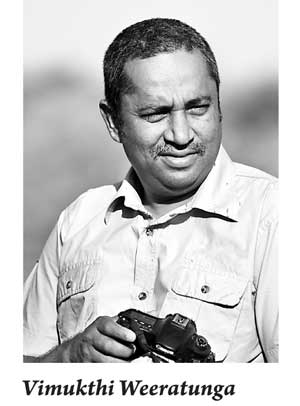Sunday Feb 15, 2026
Sunday Feb 15, 2026
Saturday, 30 September 2017 00:00 - - {{hitsCtrl.values.hits}}
 I still remember my first time in the wild. It is a play-by-play of vivid memories of our first trip to Wilpattu when I was but a child. After four and a half decades, the good times we shared during that amazing safari – the sound of laughter, the smell of dust, the feel of the wind on my face – is fresh as day.
I still remember my first time in the wild. It is a play-by-play of vivid memories of our first trip to Wilpattu when I was but a child. After four and a half decades, the good times we shared during that amazing safari – the sound of laughter, the smell of dust, the feel of the wind on my face – is fresh as day.
I am from a generation past; one which traipsed around the rural districts of ‘Ceylon’. My father’s government assignments took us to all corners of the island where breathing in the scents of the wild, I found my calling. I saw the world through my father’s eyes; the struggles of the people coping with an unforgiving life in distant malaria-ridden lands, made me admire the tenacity of a civilisation determined to rise through perilous times. The fascination with the environment and the calling of the wild in a free, bountiful Ceylon, were therefore both a sanctuary and a revelation.
The passion that ignited in me sparked into an obsession to explore every corner of Sri Lanka. The countless miles and steps that I have trudged in all kinds of terrain across this amazing island have not diminished this fascination over time. As the decades flew by, I watched the people destroy the land and wished that I was still holding my father’s hand on that hot summer afternoon. Bursting population and ill-planned policies have mercilessly beaten our natural heritage. Destruction of natural habitats in the name of development is driving species to the brink of extinction. The rippling effects have even tainted the food and water consumed by the so-called superior species – humans.
The destruction is not only for the fragile species, as the larger, stronger animals such as elephants, leopards and bears are struggling to survive in shrinking habitats, sparking a human-beast conflict which leaves heavy casualties on both sides. It shames me to see that we have accepted the defeat of our self-inflicted injuries to nature. The sluggish government intervention to preserve the environment may result in some of the fascinating wildlife and breathtaking habitats as we know them, fading in our lifetime.
The future of our natural heritage is not guaranteed by declaring a few square miles as protected when most of the wildlife lives outside the protected circle. As smaller habitats in the low country wet zone are being cleared for commercial crops and buffer zones of protected areas are cleared, the connectivity between the protected networks is being lost. Options to maintain our natural habitats at a viable level are few and far between. Their future rests in the hands of a small contingent of warriors who have challenged policymakers and taken many to courts.
The joined hands of those who care for nature is the last line of defence and give hope to build a stronger case and a voice that cannot be brushed aside by those who pursue development at any cost.
It is a new way of thinking and an attitude that needs to come over the present trend which can flow through society as an ideology to counter the self-destructive path we have walked, blinded by greed and disrespectfulness to our environment. I hope we’ve done just enough to at least stall the damage, thus giving breathing space to others after us to take on this unfinished battle to save what is wild and free in this magical island. I have lost many battles in this war but will relentlessly fight to my last day and, hopefully looking back, the guilt I feel on my shoulders may lessen, knowing that I have tried my best and have left a remnant of hope for the next generation.